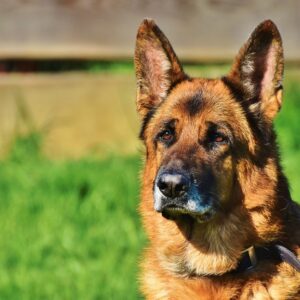For much of our long and storied history with canines, humans have trained dogs to use their heightened senses to our benefit. Hunting, guarding, tracking – these are all tasks for which dogs have been prized. Recently a surprising, new potential skill has been discovered: gluten detection.
What is Gluten and Why is it a Problem?
Gluten is a protein found in many staples of the human diet: wheat, barley, and rye. For most people, there is no issue with gluten. However, for a growing number of people diagnosed with Celiac disease, consuming gluten can lead to severe health complications.
With Celiac disease, any gluten consumed leads to the body’s immune system damaging the small intestine, which can lead to nutrient absorption issues. Besides Celiac, some people have a gluten sensitivity, which while not life-threatening, can cause discomfort and health problems.
Expert Gluten Detection: Where Dogs Come In
Our furry friends have an incredible ability to detect a broad and diverse range of scents. This capability comes in handy when a gluten-free diet becomes a necessity rather than a dietary preference. With training, a dog can excel at gluten detection, aiding people with Celiac Disease or gluten sensitivities.
The idea is not as far-fetched as it may initially appear. After all, we have trained dogs for centuries to use their powerful noses to find things that humankind can’t. Dogs can be trained to detect anything from narcotics to cancer, so why not gluten?
How Are Dogs Trained to Detect Gluten?
Dogs undergo a considerable amount of training to succeed at gluten detection. Professional trainers usually start with a young dog who is curious and open to learning. Over time they reward the dog for indicating when it smells gluten. This type of task falls under the larger scope of scent detection dog training.
A critical aspect of the training is to ensure the dog can detect gluten in all its forms – raw grains, flour, bread, crackers, etc. Most importantly, the dog should also be able to determine when gluten is present in a cooked meal, where it might be hidden among many other scents.
The Impact of Gluten Detection Dogs
The potential benefits of a gluten detection dog are enormous. For individuals with severe cases of Celiac or high gluten sensitivities, having a secondary method to ensure meals are gluten-free can offer a sense of security.
These dogs could become essential at restaurants where the risk of cross-contamination is high or when traveling in countries where language barriers may make it difficult to adequately communicate dietary needs.
Beyond external validation, gluten detection dogs can also help in educating others about Celiac disease and gluten sensitivities. They prompt conversations that can help spread awareness and understanding.
Assessing the Reliability of Gluten Detection Dogs
While dogs trained in gluten detection can provide a valuable service, they shouldn’t be the sole method relied upon to ensure a gluten-free diet. These dogs are part of a broader management strategy that includes ingredient awareness, label reading, and direct communication with food preparers about dietary needs.
Conclusion
Even as science continues to provide us with more advanced testing techniques, our canine companions are proving they have a role in many aspects of our lives – from companionship, protection, therapy, and now gluten detection. These super dogs are reshaping our understanding of detrimental health conditions and offering new solutions for management and relief.



